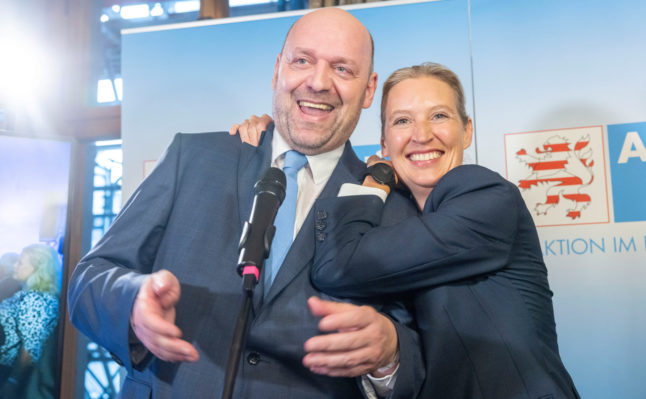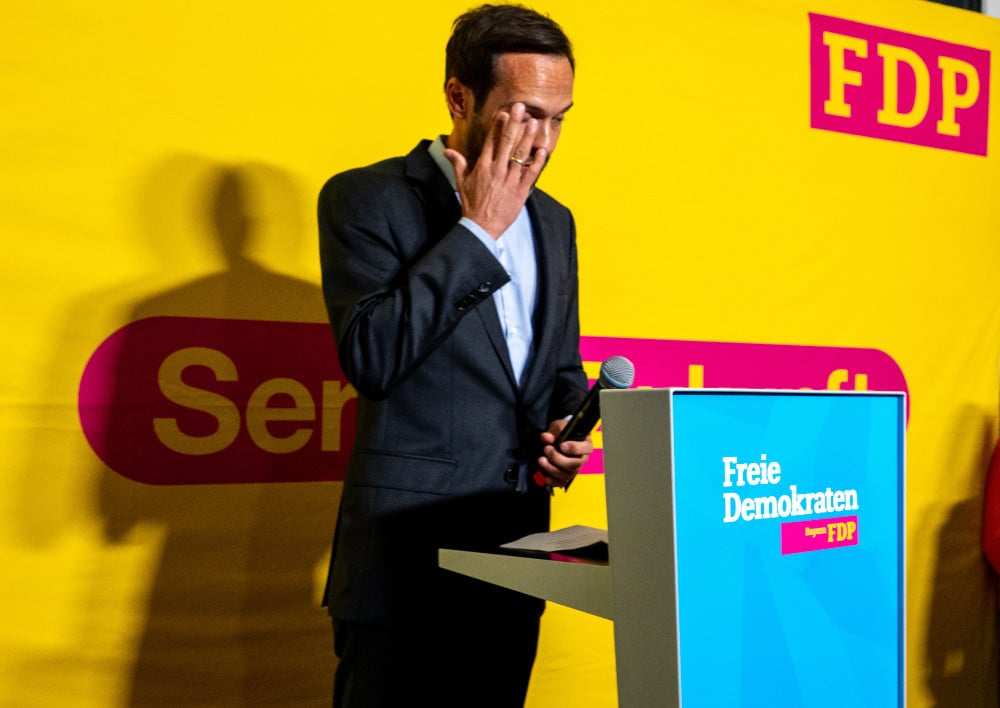State elections: What the results tell us about the future of German politics

On Sunday's state elections, Chancellor Scholz's coalition government was delivered a big blow, with the far-right AfD making big gains. What do the results in Bavaria and Hesse reveal about German politics in general?
Sunday might have “only” revealed the results of two state elections - in southern Bavaria and central Hesse - but for the government in Berlin they were a wake up call about the direction of German politics.
In both states, the Social Democrats (SPD) faced record low results. In Bavaria, the SPD came in fifth place with just 8.4 percent of the vote. In Hesse, where Interior Minister Nancy Faeser ran to oust longtime CDU leader Boris Rhein as state premier, they landed a distant third - well behind the CDU and AfD.
READ ALSO: Scholz's coaltion dealt blow in German state elections as far-right makes gains
The Free Democrats (FDP) continued its series of defeats in state elections, being thrown out of parliament in Bavaria and almost losing in Hesse.
Despite significant losses, the Greens fared comparatively well. In Hesse, they could even continue to govern with the CDU.
The trend in these elections is clearly to the right - and far to the right. The AfD, which is classified by the Office for the Protection of the Constitution as a suspected right-wing extremist party, is no longer just an eastern German mass phenomenon, having won 18.4 percent of the vote in Hesse, and 14.6 percent in Bavaria.
That makes the once-fringe party the second-strongest and third-strongest party in each state. The result in Hesse is the highest ever in state elections in western Germany.
So there's no doubt about it - the two elections have shaken up federal politics quite a bit. Where do things go from here?
Is Germany turning more to the right?
The AfD celebrated itself as a big winner on Sunday. "The wind is changing in Germany, it's going from left to right," said Bernd Baumann, the first parliamentary director of the Bundestag parliamentary group.
AfD leader Alice Weidel wrote on X (formerly Twitter), "Our record results prove our policies right!" and added a "Ready for more" - a slogan the party has used since the summer to make clear it wants to be part of a coalition at the state and someday even federal level.
READ ALSO: State elections: Why did the far-right AfD do so well in state elections in Bavaria and Hesse?
The political landscape could be really shaken up next year, when new state parliaments are elected in the eastern Saxony, Thuringia and Brandenburg.
In the polls, the AfD was recently ahead of all other parties in the three states with over 30 percent.
But their future success is not so straightforward. On Sunday evening, however, the AfD also suffered a defeat. In Bitterfeld-Wolfen in the eastern state of Saxony-Anhalt, it did not succeed as hoped in winning the mayoral election and becoming Germany's first ever mayor.
A similar situation occurred a few weeks ago in the small city of Nordhausen in the neighbouring eastern state of Thuringia.

Robert Lambrou, co-chairman of the AfD in Hesse, and federal spokeswoman Alice Weidel celebrate the first forecast of the state election in Hesse. Photo: picture alliance/dpa | Helmut Fricke
Election loser from Berlin: What will become of Nancy Faeser?
The fact that perhaps the biggest loser of the election evening does not hail from either Hesse or Bavaria, but rather Berlin, is perhaps symptomatic of this election. German Interior Minister Nancy Faeser was sent into the race in Hesse for state premiere by the SPD because there was no alternative. And she failed miserably.
Faeser lost to Rhein and his CDU by almost 20 percentage points: 15.1 to 34.6.
But it is quite unlikely that Scholz will let her go, nor that Faeser will step down herself. So far, the chancellor has not expressed any doubts about Faeser and has explicitly praised her several times in recent days for her actions to reform the European asylum system.
This was also made clear by the entire party leadership on Sunday evening: "We stand by Nancy Faeser," said Kühnert.
READ ALSO: What could Hesse elections mean for international residents?
What will Scholz do next?
In any case, Faeser is returning to Berlin rather battered after the disastrous election evening in Hesse’s state capital of Wiesbaden. Her big ticket issue in the elections was curbing irregular immigration - a topic on which Chancellor Scholz could take the reins on himself.
In his own party, too, there is growing resentment about the image of it being part a coalition government which quarrels constantly and achieves too little - such as Germany's controversial heating law, which saw some dissatisfied voters shift to the AfD and has still yet to be passed.
The coalition's SPD's low results only shed more light on its issues within the federal government.
"There must now be more speed and a different style," said SPD leader Lars Klingbeil on Sunday evening.
What will the FDP do?
One factor of uncertainty for Germany's traffic light coalition is how the FDP will now deal with the election results.
But in any case "It can't go on like this," said FDP deputy chairman Wolfgang Kubicki to Bild.

Martin Hagen (FDP), state chairman of Bavaria, puts his hands in his face at the FDP election party on Sunday. Photo: picture alliance/dpa | Stefan Puchner
"This is the clear signal that we in Berlin must finally take up what moves people. On the nuclear power plant issue, on the heating law or on migration policy, we were or are consistently at odds with the majority opinion.
“If we don't present solutions, in the end, the issues will seek coalitions."
What will happen to CSU leader Markus Söder?
The big question of who will be the chancellor candidate for the Christian Democrats (CDU) and Bavarian sister party CSU is just as open as before.
Although Bavaria's Prime Minister and CSU leader Markus Söder has not been able to make up for his disastrous result in the last election five years ago, the numbers did not deteriorate much further this time around.
Still, Söder remains in the game as a chancellor candidate.
"With such a strong AfD, it also needs a very strong state premier," he told ZDF. "Anything else is out of the question for me."
READ ALSO: What's at stake for international residents in Bavaria's elections?
Comments
See Also
Sunday might have “only” revealed the results of two state elections - in southern Bavaria and central Hesse - but for the government in Berlin they were a wake up call about the direction of German politics.
In both states, the Social Democrats (SPD) faced record low results. In Bavaria, the SPD came in fifth place with just 8.4 percent of the vote. In Hesse, where Interior Minister Nancy Faeser ran to oust longtime CDU leader Boris Rhein as state premier, they landed a distant third - well behind the CDU and AfD.
READ ALSO: Scholz's coaltion dealt blow in German state elections as far-right makes gains
The Free Democrats (FDP) continued its series of defeats in state elections, being thrown out of parliament in Bavaria and almost losing in Hesse.
Despite significant losses, the Greens fared comparatively well. In Hesse, they could even continue to govern with the CDU.
The trend in these elections is clearly to the right - and far to the right. The AfD, which is classified by the Office for the Protection of the Constitution as a suspected right-wing extremist party, is no longer just an eastern German mass phenomenon, having won 18.4 percent of the vote in Hesse, and 14.6 percent in Bavaria.
That makes the once-fringe party the second-strongest and third-strongest party in each state. The result in Hesse is the highest ever in state elections in western Germany.
So there's no doubt about it - the two elections have shaken up federal politics quite a bit. Where do things go from here?
Is Germany turning more to the right?
The AfD celebrated itself as a big winner on Sunday. "The wind is changing in Germany, it's going from left to right," said Bernd Baumann, the first parliamentary director of the Bundestag parliamentary group.
AfD leader Alice Weidel wrote on X (formerly Twitter), "Our record results prove our policies right!" and added a "Ready for more" - a slogan the party has used since the summer to make clear it wants to be part of a coalition at the state and someday even federal level.
READ ALSO: State elections: Why did the far-right AfD do so well in state elections in Bavaria and Hesse?
The political landscape could be really shaken up next year, when new state parliaments are elected in the eastern Saxony, Thuringia and Brandenburg.
In the polls, the AfD was recently ahead of all other parties in the three states with over 30 percent.
But their future success is not so straightforward. On Sunday evening, however, the AfD also suffered a defeat. In Bitterfeld-Wolfen in the eastern state of Saxony-Anhalt, it did not succeed as hoped in winning the mayoral election and becoming Germany's first ever mayor.
A similar situation occurred a few weeks ago in the small city of Nordhausen in the neighbouring eastern state of Thuringia.

Election loser from Berlin: What will become of Nancy Faeser?
The fact that perhaps the biggest loser of the election evening does not hail from either Hesse or Bavaria, but rather Berlin, is perhaps symptomatic of this election. German Interior Minister Nancy Faeser was sent into the race in Hesse for state premiere by the SPD because there was no alternative. And she failed miserably.
Faeser lost to Rhein and his CDU by almost 20 percentage points: 15.1 to 34.6.
But it is quite unlikely that Scholz will let her go, nor that Faeser will step down herself. So far, the chancellor has not expressed any doubts about Faeser and has explicitly praised her several times in recent days for her actions to reform the European asylum system.
This was also made clear by the entire party leadership on Sunday evening: "We stand by Nancy Faeser," said Kühnert.
READ ALSO: What could Hesse elections mean for international residents?
What will Scholz do next?
In any case, Faeser is returning to Berlin rather battered after the disastrous election evening in Hesse’s state capital of Wiesbaden. Her big ticket issue in the elections was curbing irregular immigration - a topic on which Chancellor Scholz could take the reins on himself.
In his own party, too, there is growing resentment about the image of it being part a coalition government which quarrels constantly and achieves too little - such as Germany's controversial heating law, which saw some dissatisfied voters shift to the AfD and has still yet to be passed.
The coalition's SPD's low results only shed more light on its issues within the federal government.
"There must now be more speed and a different style," said SPD leader Lars Klingbeil on Sunday evening.
What will the FDP do?
One factor of uncertainty for Germany's traffic light coalition is how the FDP will now deal with the election results.
But in any case "It can't go on like this," said FDP deputy chairman Wolfgang Kubicki to Bild.

"This is the clear signal that we in Berlin must finally take up what moves people. On the nuclear power plant issue, on the heating law or on migration policy, we were or are consistently at odds with the majority opinion.
“If we don't present solutions, in the end, the issues will seek coalitions."
What will happen to CSU leader Markus Söder?
The big question of who will be the chancellor candidate for the Christian Democrats (CDU) and Bavarian sister party CSU is just as open as before.
Although Bavaria's Prime Minister and CSU leader Markus Söder has not been able to make up for his disastrous result in the last election five years ago, the numbers did not deteriorate much further this time around.
Still, Söder remains in the game as a chancellor candidate.
"With such a strong AfD, it also needs a very strong state premier," he told ZDF. "Anything else is out of the question for me."
READ ALSO: What's at stake for international residents in Bavaria's elections?
Join the conversation in our comments section below. Share your own views and experience and if you have a question or suggestion for our journalists then email us at [email protected].
Please keep comments civil, constructive and on topic – and make sure to read our terms of use before getting involved.
Please log in here to leave a comment.